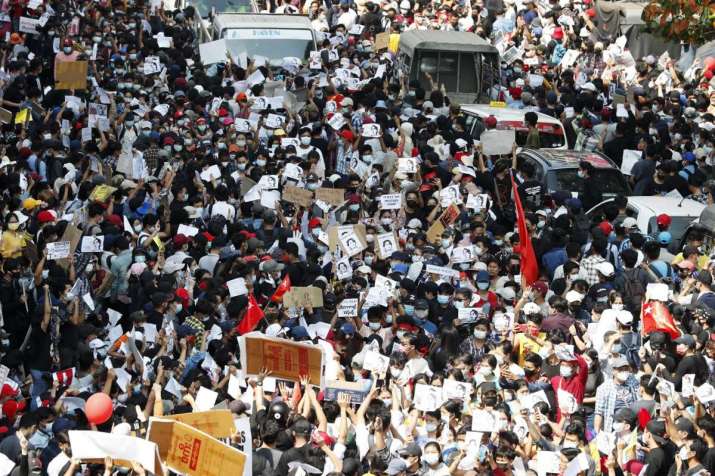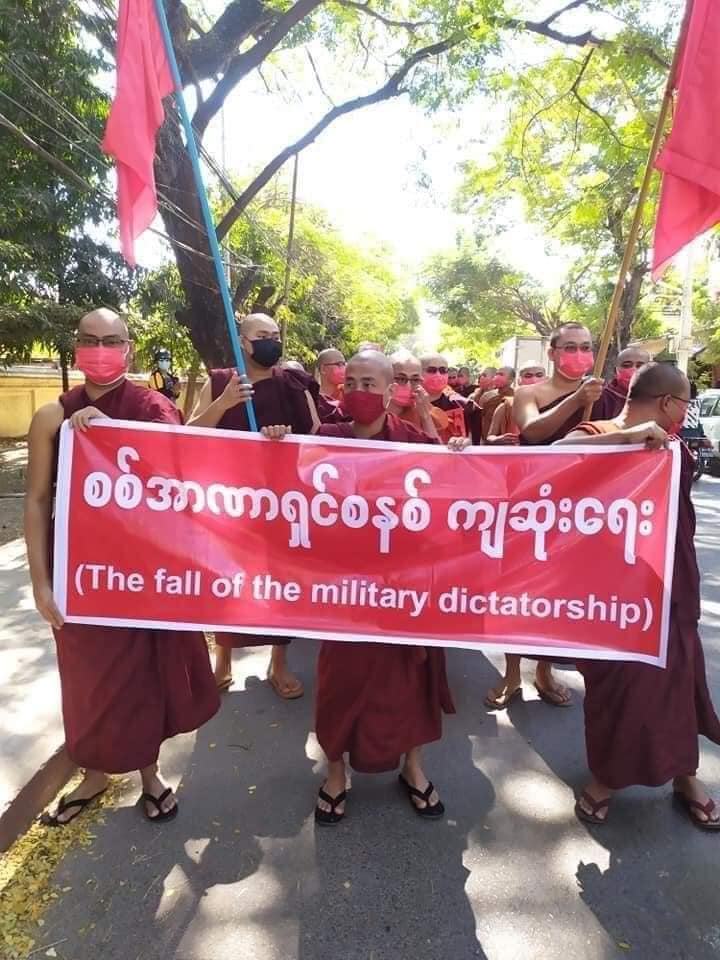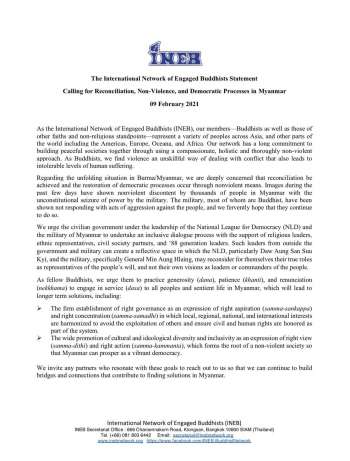NEWS
UPDATE: INEB Calls for Reconciliation in Myanmar as Pro-democracy Protests Turn Violent
By Craig Lewis
Buddhistdoor Global
| 2021-02-10 |  From facebook.com
From facebook.comLeading a growing chorus of voices in the Buddhist world in response to the military coup that overthrew the civilian government of Myanmar (formerly Burma) on 1 February,* the International Network of Engaged Buddhists (INEB) has issued a public statement urging reconciliation in the Southeast Asian nation and calling for the unhindered restoration of democratic processes.
In an open letter shared with Buddhistdoor Global titled “Calling for Reconciliation, Non-Violence, and Democratic Processes in Myanmar,” INEB, which works to overcome suffering by applying the values of the Buddhadharma through socially engaged Buddhism, states:
As the International Network of Engaged Buddhists (INEB), our members—Buddhists as well as those of other faiths and non-religious standpoints—represent a variety of peoples across Asia, and other parts of the world including the Americas, Europe, Oceana, and Africa. Our network has a long commitment to building peaceful societies together through using a compassionate, holistic and thoroughly non-violent approach. As Buddhists, we find violence an unskillful way of dealing with conflict that also leads to intolerable levels of human suffering.
Regarding the unfolding situation in Burma/Myanmar, we are deeply concerned that reconciliation be achieved and the restoration of democratic processes occur through nonviolent means. Images during the past few days have shown nonviolent discontent by thousands of people in Myanmar with the unconstitutional seizure of power by the military. The military, most of whom are Buddhist, have been shown not responding with acts of aggression against the people, and we fervently hope that they continue to do so.
We urge the civilian government under the leadership of the National League for Democracy (NLD) and the military of Myanmar to undertake an inclusive dialogue process with the support of religious leaders, ethnic representatives, civil society partners, and ‘88 generation leaders. Such leaders from outside the government and military can create a reflective space in which the NLD, particularly Daw Aung San Suu Kyi, and the military, specifically General Min Aung Hlaing, may reconsider for themselves their true roles as representatives of the people’s will, and not their own visions as leaders or commanders of the people.
As fellow Buddhists, we urge them to practice generosity (dana), patience (khanti), and renunciation (nekkhama) to engage in service (dasa) to all peoples and sentient life in Myanmar, which will lead to longer term solutions, including:
• The firm establishment of right governance as an expression of right aspiration (samma-sankappa) and right concentration (samma-samadhi) in which local, regional, national, and international interests are harmonized to avoid the exploitation of others and ensure civil and human rights are honored as part of the system.
• The wide promotion of cultural and ideological diversity and inclusivity as an expression of right view (samma-dithi) and right action (samma-kammanta), which forms the root of a non-violent society so that Myanmar can prosper as a vibrant democracy.
We invite any partners who resonate with these goals to reach out to us so that we can continue to build bridges and connections that contribute to finding solutions in Myanmar.
INEB was established in Thailand, in 1989 by the prominent Thai academic, activist, and social critic Sulak Sivaraksa and a group of Buddhist and non-Buddhist thinkers and social activists. The organization was formed with the aim of connecting engaged Buddhists around the world to promote understanding, cooperation, and networking among inter-Buddhist and inter-religious groups, and to address global issues such as human rights, conflict resolution, and environmental concerns. INEB’s members include monks, nuns, social workers, and academics from more than 25 countries in Asia, Australasia, Europe, and North America, working together under the umbrella of kalyana-mitrata.**

Image courtesy of INEB
Myanmar’s military declared a year-long state of emergency on 1 February, after detaining President Win Myint, State Counselor Aung San Suu Kyi, and other senior members of the governing National League for Democracy (NLD) party. The coup took place just hours before the country’s new parliament was due to convene following a general election in November last year, during which the NLD made substantial electoral gains. Suu Kyi is now believed to be under house arrest, while the reins of power have been handed over to commander-in-chief General Min Aung Hlaing. The military, which had backed the parliamentary opposition in the vote, has insisted that it staged the coup in response to election fraud, however the national election commission has said there is no evidence to support these claims.
As peaceful pro-democracy protests and strikes continue, with Buddhist monks and nuns joining the tens of thousands of civilian demonstrators marching defiantly in towns and cities across the country in support of a growing civil disobedience campaign,* reports emerged of security personnel responding to the peaceful protests with increasing violence on Tuesday, using water cannons, teargas, rubber bullets, and live ammunition. Among scores of injured, one woman was reported to be in critical condition yesterday as a result of a gunshot wound to the head.
Demonstrators, including civil servants, turned out in even greater numbers on Wednesday in the capital Nay Pyi Taw, in the country’s largest city and former capital Yangon (formerly Rangoon), and in Mandalay, with media estimates of 100,000 protestors gathered in Yangon today.
Amid the violent crackdown, media reports also indicate several instances of police personnel switching sides to join the protestors and offer protection, including in Nay Pyi Taw, the town of Magwe in central Myanmar, Loikaw, the state capital of Kayah, Pathein, the capital of the Ayeyarwady Region, the southern township of Myeik, and in the central city of Mawlamyine.
Myanmar is a predominantly Theravada Buddhist country, with 88 per cent of the population of roughly 60 million people identifying as Buddhists, according to census data for 2014. Christianity, folk religions, and Islam represent the bulk of the remainder. Buddhist monks, venerated throughout Burmese society, are estimated to number in excess of 500,000, with some 75,000 nuns in this Southeast Asian country.
* Peace Sangha Union Issues Statement on Myanmar Coup as Buddhist Monks Join Pro-democracy Protests and The Other Shoe Drops: Reflections on Myanmar’s Latest Coup (Buddhistdoor Global)
** Kalyaṇa-mittata (Pali) kalyaṇa-mitrata (Skt.), the Buddhist concept of spiritual friendship.
See more
International Network of Engaged Buddhists
Peace Sangha Union - PSU 2021 (Facebook)
International Campaign for the Rohingya (The Action Network)
Burma Campaign UK
Burma Task Force
Justice for Myanmar
Myanmar protests resume, West condemns security response (Reuters)
Myanmar protesters return to streets in huge numbers amid police defections (The Guardian)
Myanmar protests: woman shot in head as police response escalates (The Guardian)
Related news from Buddhistdoor Global
Engaged Buddhism: JTS Korea Donates COVID-19 Relief Supplies to Myanmar in Cooperation with INEB and KMF
Engaged Buddhist Sulak Sivaraksa Speaks Out During Thai Pro-Democracy Protests
Fugitive Nationalist Buddhist Monk Surrenders to Police in Myanmar Ahead of Poll
Rohingya Refugees Raise Funds to Help Displaced Buddhists in Myanmar’s Rakhine State
Rakhine Community in Bangladesh Protests Myanmar’s Military Aggression in Rakhine State
Myanmar’s Military Seeks to Jail Buddhist Monk over Criticism
Buddhist Monk Stands Firm Against Hatred and Violence in Myanmar
Interfaith Activists in Myanmar Defy Anti-Muslim Nationalists with #WhiteRose4Peace Campaign
Buddhist Peace Organization Issues Open Letter Decrying Treatment of Myanmar’s Rohingya
Aung San Suu Kyi Urges Tolerance and Unity in Myanmar’s Troubled Rakhine State
Related features from Buddhistdoor Global
The Other Shoe Drops: Reflections on Myanmar’s Latest Coup
Sea of Suffering: The Rohingya and the Conundrum of Buddhist Terror
Buddhistdoor View: Reconciling Nationalism and Buddhism



















